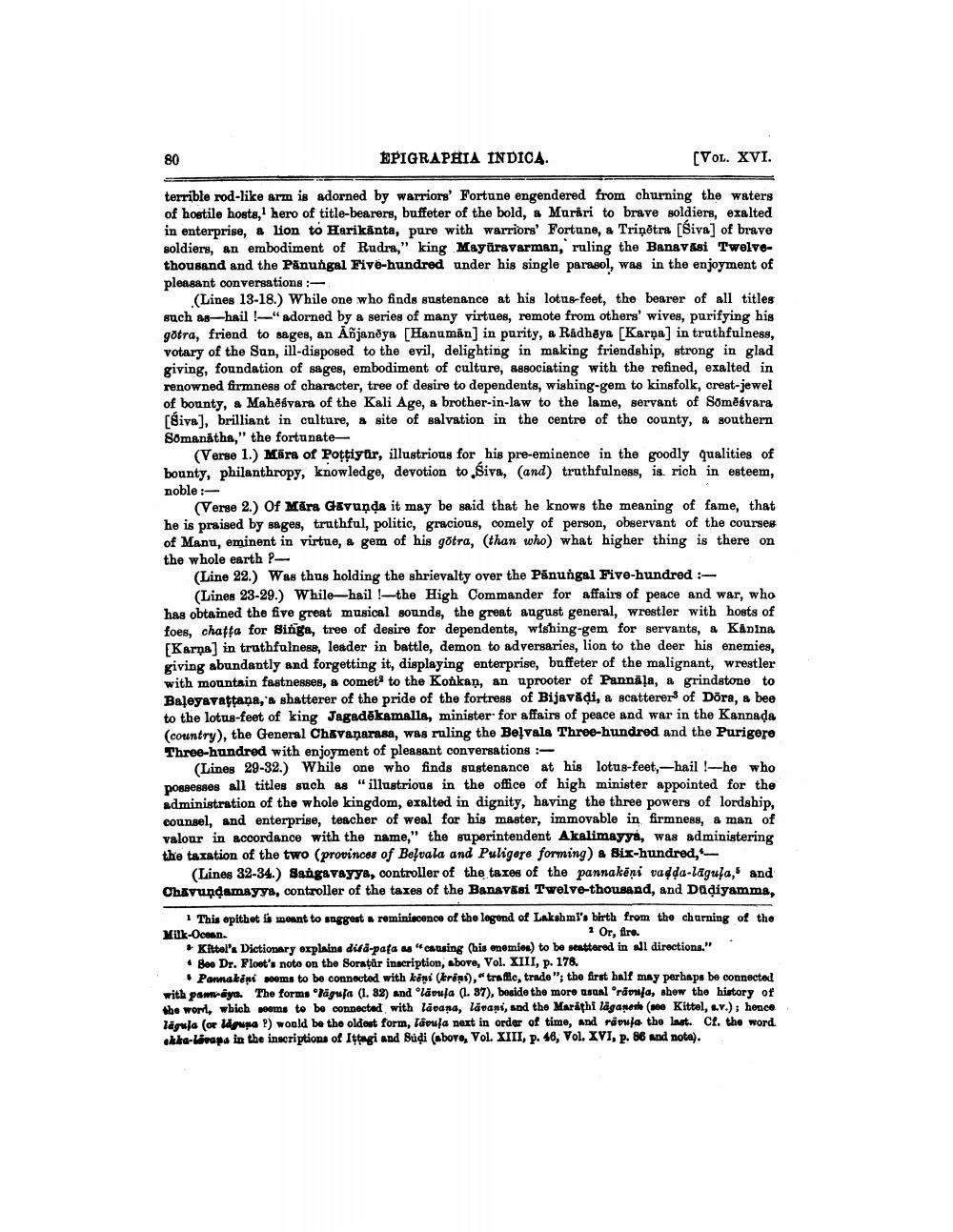________________
EPIGRAPHIA INDICA.
(VOL. XVI.
terrible rod-like arm is adorned by warriors' Fortune engendered from churning the waters of hostile hosts, hero of title-bearers, buffeter of the bold, a Murări to brave soldiers, exalted in enterprise, a lion to Harikānta, pure with warriors' Fortune, a Triņētra (Siva] of brave soldiers, an embodiment of Rudra," king Mayūra varman, ruling the Banavasi Twelvethousand and the Pānungal Tivo-hundred under his single parasol, was in the enjoyment of pleasant conversations :
(Lines 13-18.) While one who finds gustenance at his lotus-feet, the bearer of all titles such as-hail !-"adorned by a series of many virtues, remote from others' wives, purifying his gotra, friend to sages, an Anjaneya (Hanuman) in purity, a Radheya (Karna] in truthfulness, votary of the Sun, ill-disposed to the evil, delighting in making friendship, strong in glad giving, foundation of sages, embodiment of culture, associating with the refined, exalted in renowned firmness of character, tree of desire to dependents, wishing-gem to kinsfolk, crest-jewel of bounty, a Maheśvara of the Kali Age, a brother-in-law to the lame, servant of Soměsvara [siva), brilliant in culture, & site of salvation in the centre of the county, & southern Somanátha," the fortunate
(Verse 1.) Mora of Pottiytir, illustrious for his pre-eminence in the goodly qualities of bounty, philanthropy, knowledge, devotion to Siva, (and) truthfulness, is rich in esteem, noble :
(Verse 2.) Of Māra Gavunds it may be said that he knows the meaning of fame, that he is praised by sages, truthful, politic, gracious, comely of person, observant of the courses of Manu, eminent in virtue, a gem of his gotra, (than who) what higher thing is there on the whole earth -
(Line 22.) Was thus holding the shrievalty over the Pānungal Five-hundred :
(Lines 23-29.) While-hail I-the High Commander for affairs of peace and war, who has obtained the five great musical sounds, the great august general, wrestler with hosts of foes, chatta for Singa, tree of desire for dependente, wishing-gem for servants, a Kapina Karna) in truthfulnese, leader in battle, demon to adversaries, lion to the deer his enemies, giving abundantly and forgetting it, displaying enterprise, buffeter of the malignant, wrestler with mountain fastnesses, a comete to the Konkan, an uprooter of Pannala, a grindstone to Baleyavattana,' shatterer of the pride of the fortress of Bijavādi, a scatterers of Dóra, & bee to the lotus-feet of king Jagadēkamalle, minister for affairs of peace and war in the Kannada (country), the General Chavanarasa, was ruling the Beļvals Three-hundred and the Purigere Three-hundred with enjoyment of pleasant conversations :
(Lines 29-32.) While one who finds sustenance at his lotus-feet, -hail I-he who possesses all titles such as “illustrious in the office of high minister appointed for the administration of the whole kingdom, exalted in dignity, having the three powers of lordship, counsel, and enterprise, teacher of weal for his master, immovable in firmness, a man of valour in accordance with the name," the superintendent Akalimayy), was administering the taxation of the two provinces of Beļvala and Puligere forming) a six-hundred,
(Lines 32-34.) Sangavayya, controller of the taxes of the pannakēni vadda-lāgula, and Chavundamayya, controller of the taxes of the Banavāsi Twelve-thousand, and Dudiyamma,
1 This epithet i mount to suggest reminiscence of the legend of Lakshmi's birth from the churning of the Milk-Ocean.
1 Or, flre. Kittel's Dictionary explains did-pafa "causing (his onomies) to be reattored in all directions." • See Dr. Ploet's noto on the Boratür inscription, above, Vol. XIII, p. 178.
Parmakini rooms to be connected with koņi (krons), traffic, trade"; the first half may perhaps be connected with pamreye. The forms Pagufa (1. 82) and lāvula ( 37), beside the more usual raufa, show the history of the worl, which seems to be connected with larana, lavani, and the Marathi lagapene (ne Kittel, .v.); hence légula (or Iduna P) would be the oldest form, Tapula nert in order of time, and rivula tho last.ct. the word okka-Livaps in the inscriptions of Idagi and Suți (above, VOL. XIII, p. 16, Vol. XVI, p. 86 and nota).




